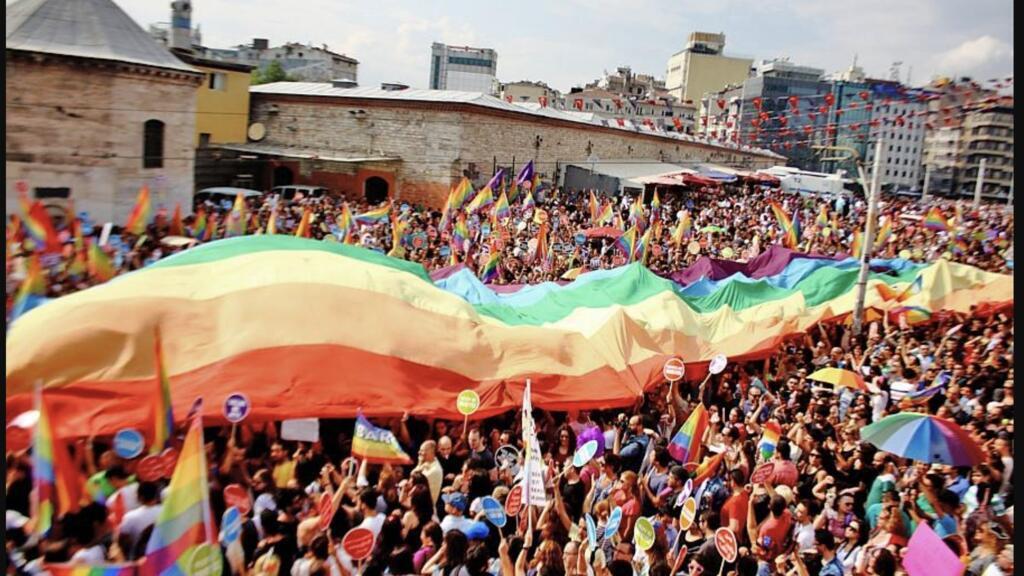Criminalising identity: Turkey’s LGBTQI+ community under threat
Issued on:
International human rights groups are calling for the withdrawal of proposed legislation against Turkey’s LGBTQI+ community, who warn that the law could effectively criminalise their community, which is already facing a growing legal crackdown.

This week, the New York-based Human Rights Watch called on the Turkish government to drop a proposed law targeting the country’s LGBTQI+ community. Amnesty International has made a similar demand.
Rights groups sound the alarm
The proposed legislation, which was leaked to the media, criminalises attitudes and actions deemed contrary to biological sex, carrying sentences of up to three years in prison.
“It’s really one of the worst reforms, or proposed reforms, we’ve seen in many years,” warns Emma Sinclair-Webb, Turkey director of Human Rights Watch.
“Because it basically says that the government or the authorities can decide that certain behaviour and attitudes are contrary to biological sex and general morality, and are criminal on that basis.”
Turkey's Pride struggling to survive amid LGBTQ+ crackdown
Widespread impact
Sinclair-Webb claims that with the proposed law criminalising the promotion of the LGBTQI+ community, its impact would be far-reaching.
“That could affect journalists reporting on matters connected with gender, sexuality and gender identity. It could mean NGOs working to defend the rights of LGBTQI+ people from stigmatisation and discrimination.”
Since the foundation of the Turkish Republic in 1923, homosexuality has never been criminalised. But LGBTQI+ rights advocates warn that this could change, given the broadly written nature of the proposed law.
“It’s not even same-sex sexual acts that are criminalised. It’s just your appearance. Because the law says anything against biological sex. I mean, it could be very widely interpreted,” explains Öner Ceylan of Lambda a LGBTQI+ rights group in Turkey
“So, this could be a woman with short hair or wearing trousers,” adds Ceylan. “Let’s say I’m on the streets, I’m being myself, and I can go to jail for it for three months. Then I’m released, and what happens next? I can easily go back to jail according to that law. So it can be a perfect excuse to imprison an LGBTQI+ person.”
Turkey's embattled civil society fears worst as foreign funding dries up
Decade of crackdowns
Under the proposed law, people could face between three months and three years in prison, opening the door to lengthy pre-trial detention and the risk of mass arrests - a prospect that worries rights groups.
Since the early 2000s, Turkey’s LGBTQI+ community has become increasingly visible and vibrant, particularly in Istanbul, with gay clubs, cafés and bars. The city once hosted large Pride marches, with the 2015 event drawing over one hundred thousand people.
However, for the past decade, Turkey’s religiously conservative government has been cracking down on the community in the name of protecting the family. Pride marches have been banned since 2015.
“Now they’ve banned any kind of LGBTQI+ event in the public sphere,” explains Yıldız Tar of Kaos, an LGBTQI+ group. “We no longer share public venues or their addresses. So we are already living a kind of criminalised life, as if many queer people coming together is a criminal activity, which it is not.”
Tar warns that the proposed law represents the endgame in the government’s campaign. “It’s the result of a decade-long war against LGBTQI+ people, and if this law passes, this is the last step.”
Turkey's embattled civil society fears worst as foreign funding dries up
Rising rhetoric and rising
In September, the Turkish Interior Ministry filed a criminal complaint against openly gay pop singer Mabel Matiz, alleging that one of his songs violated morals and obscenity laws.
Meanwhile, an all-women pop group, Manifest, was detained under the country’s morality laws for one of their performances, prompting the group to end their sell-out national tour.
President Recep Tayyip Erdoğan has been ramping up his rhetoric against the LGBTQI+ community, even equating it with terrorism. The proposed legislation also targets the country’s transgender community, banning gender-affirming healthcare for those under the age of 25.
The LGBTQI+ community has vowed to step up its protests against the law and has secured the support of Turkey’s two main opposition parties in opposing it. But Tar warns that if the law passes, many in the community will likely flee the country - though he says he and others are ready to resist, whatever the cost.
“We will continue to do our work, to share the very basic knowledge that being LGBTQI+ is not a threat to society. It’s not a threat to the family,” declares Tar. “But it will be harder, and most of us will end up in jail.”
Daily newsletterReceive essential international news every morning
Subscribe